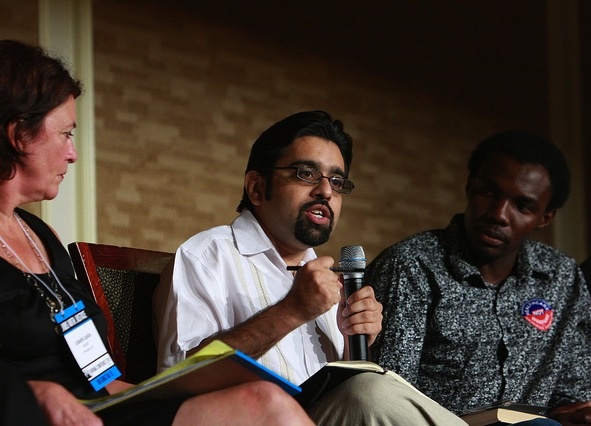Organizing for a true reconstruction in the Gulf Coast: An interview with labor leader Saket Soni

New Orleans labor organizer Saket Soni speaking at a Jobs With Justice conference in 2011. (Photo by Jobs With Justice via Flickr.)
Saket Soni is a national labor leader and an organizer of day laborers, immigrant workers, guest workers and others in New Orleans, the South and the country. He is the executive director of the New Orleans Workers' Center for Racial Justice and the National Guestworker Alliance, which were formed in the aftermath of Hurricane Katrina to organize vulnerable workers in the city's reconstruction.
Soni, who has written about his own experiences as an undocumented immigrant, has organized several successful, multiracial campaigns since Katrina, including an eight-year campaign that culminated in a $20 million settlement earlier this year for guest workers from India against shipbuilding company Signal International in Mississippi. Signal was convicted in February of human trafficking and other labor violations. The Workers' Center and its affiliates have also achieved significant wins on immigration issues and living wage campaigns and have expanded their work across the country and internationally.
Facing South recently caught up with Soni to get his take on progress made since Katrina and lessons learned since the storm hit the Gulf Coast 10 years ago this week. This interview has been edited for clarity.
What brought you to the Gulf Coast after Katrina in 2005?
When Katrina hit, I was a community organizer in Chicago. I was knocking on doors and talking to low-income renters in Chicago's South Side. … When the levees broke, I remember it shattering the myth that people were doing OK. I was just trying to make sense of how a disaster like that could happen in the United States and how it could be followed by such extraordinary inaction.
In order to make sense of it, I came down to New Orleans. … In many ways, I came down in search of an organizing tradition that I had heard about, which was the tradition of Ella Baker and the Student Nonviolent Coordinating Committee. Many of my mentors post-Katrina in the Gulf Coast ended up being the people who were shaped by Ella Baker. I ended up staying and founding the New Orleans Workers' Center for Racial Justice in the midst of that and trying my best to follow that tradition.
What was the situation for workers in New Orleans and the Gulf Coast after Katrina hit?
After Hurricane Katrina and the breach of the levees, New Orleans became the biggest construction site in the world. African-American workers were excluded from the reconstruction, and immigrant workers were exploited in the reconstruction. The Workers' Center was founded by workers who were being deeply extorted or severely excluded, and they were asking for a voice and a place inside the reconstruction of the Gulf Coast. Our first members [of the Workers' Center] were the people who stood under Lee Circle, who helped rebuild the financial districts and the rest of the city, and guest workers who came from across the world into labor camps in Louisiana, Mississippi and Texas. These are the people who, even though they were rebuilding in atrocious conditions, were demanding dignity at work and in their lives.
How did Ella Baker influence your work in New Orleans?
The teachers I had would talk about organizing as slow, respectful work and the importance of patience, especially when approaching the long-standing inequalities in the South. I think that was an organizing tradition based on those simple tenets of respect and patience and harvesting the wisdom and even the genius of directly affected people.
Post-Katrina New Orleans was a time when many, many people came down to offer solutions, but the organizer tradition of Ella Baker taught organizers to ask more questions rather than providing answers. That's what we tried to do — harvest the wisdom and knowledge of people who were affected, certainly, by problems but who also had a view of what the solutions should be.
What have been some of the successes over the past 10 years?
Undocumented day laborers who were helping to rebuild the city were facing incarceration and deportation just for the so-called crime of going to work and looking for work. They won the furthest-reaching policies in the country defending immigrants from deportation and recently were recognized by city council as heroes of the reconstruction.
African-American workers fought for jobs and then careers in their own city and recently won a $10.55 living wage for city workers and for city contract employees. Guest workers escaped from labor camps and marched all the way to the White House. One group within our members that campaigned recently won a $20 million legal settlement when a New Orleans court issued a verdict that the company that had been using their labor was guilty of human trafficking.
But I think the biggest success is that we have slowly rebuilt not just the brick and mortar city but civil society and the social fabric, and built a social movement that has the ability to dream despite the challenges. We're one step closer to a true reconstruction — the kind of reconstruction that New Orleans needs and the South needs and the country needs, which is a reversal of power and governance of society by the people who are at its lowest rung.
What are some of the promising approaches you see to worker organizing in the South?
I think the work that STAND with Dignity [a grassroots project of the Workers' Center that organizes low-income residents and workers] is doing is an example of exciting innovation. They are leading a citywide campaign to reverse intractable poverty by attacking the issue of structural unemployment. The goal is not just to win jobs but long-term, predictable, decent, secure employment that comes with the promise of careers and advancement so that an entire city can be lifted out of poverty. This is incredibly innovative. There have been millions of private-sector jobs that have been created in the last decade, but in large part, they have not been quality jobs. They've been poverty jobs. And STAND is really setting out to reverse that in New Orleans. …
[Another] example of innovation is the organizing of the guest workers who arrived in the Gulf Coast after Katrina. In the last years, they've organized in labor camps in the Southern region but also internationally. The National Guestworker Alliance has organized workers in the United States and their families in India, workers in sending countries and receiving countries, and really seeking the first step at a global approach to organizing. Those are some examples of innovation.
All this innovation has happened by necessity. No one thought, let's be creative. Everyone thought, let's find the necessary answer to this problem. One necessary answer after another, we created one innovation after another.
Organizing day laborers and guest workers intertwines worker issues with the immigrant rights movement. How do you see those issues relating?
It's intertwined with the immigrant rights movement and with the racial justice movement in the United States. STAND with Dignity — yes, they're fighting for inclusion and advancement but they're also fighting for racial justice. To overcome exclusion and win dignified decent work, they have to push against the criminalization of African Americans. Winning the right to decent work is more than just job access. It's overcoming barriers and violence very much based on race and is therefore very much part of the racial justice movement.
Similarly, the Congress of Day Laborers [which organizes primarily undocumented workers at day laborer corners and in detention centers] wants to win dignified work but also wants to stop deportations in a country that asks for immigrants to work but then criminalizes them when they seek out work. These movements are intertwined and in many ways are one movement. In the South, human rights, civil rights and labor rights have always been very deeply intertwined, and they still are now.
How do you build a movement that is led by the workers — often very marginalized workers?
The movement is led by people who are really the majority. Most of the country today is experiencing the kind of insecurity that our members are experiencing. Our members are emblematic of how many, many people in the United States are experiencing work and experiencing anxiety and economic inequality. In today's economy, the agricultural worker and the adjunct professor are in some extent in the same boat and will find themselves more and more in the same economy. It's true that our members are experiencing the extreme edge of racism and injustice, but strategies that, if they were once uniquely Southern strategies, are now being exported everywhere. Right-to-work is in the Midwest, in Michigan of all places.
I think that our members could be characterized as "marginalized" but they're certainly not "marginal." They're very much the majority.
What do you think the country should take away from the experience and aftermath of Hurricane Katrina?
Our culture loves success stories and comeback kids and stories about miracles and revivals. Katrina was a disaster 500 years in the making, and it's not going to take 10 years to undo it. We've taken some important steps in the right direction, but the task of rebuilding New Orleans and rebuilding the South is a big one.
If I've learned anything from the people we're organizing, it's that they have extraordinary dreams. They dream of a true reconstruction. We got a glimpse of what that could look like during the First Reconstruction in the 1870s when African-American schools and churches were built and state legislators were elected. We then saw that reconstruction attacked by reactionaries. Today, we're seeing modern-day civil rights defenders and human rights defenders attacked similarly by reactionaries. Last week, Donald Trump held what was essentially a white power rally in Alabama.
There are lots of dreams to build on, and there's lots of work to be done.
Tags
Allie Yee
Allie is a research fellow at the Institute for Southern Studies and is currently studying at the Yale School of Management. Her research focuses on demographic change, immigration, voting and civic engagement.
